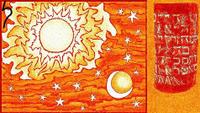
vv. 89-96
WEEK: I II III IV V VI VII VIII IX X XI
August 31: Verse 96--"I have seen a limit to all perfection, but your commandment is exceedingly broad." Once again using creation as a mirror, the psalmist views God's unlimeted perfection in contrast to the limited perfection of creation. In this entire section of Psalm 119, the psalmist has woven observed evidence with God's known character, revealing the integration of his faith with the fabric of life itself.
August 30: Verse 95--"The wicked lie in wait to destroy me, but I consider your testimonies." If you take this verse out of its context, it sounds an awful lot like "whistling in the dark." But it does indeed sit in its context. The psalmist has just declared evidence from creation and from his own life. He rests in God's word, which tells the story of God's faithfulness despite the unfaithfulness of his people. So when he considers God's testimonies while surrounded by those who lie is wait to destroy him, he is standing on truth, not on wishful thinking. I am taken back to Connie's memorial just a little over a week ago. Some of those who spoke were whistling in the dark; most were standing on truth. When tragedy hits, truth is the only real hope. Anything else is smoke and mirrors.
August 29: Verse 94--"I am yours; save me, for I have sought your precepts." First, there is a declaration: 'I am yours'. Then there is a plea: 'save me'. Finally there is a basis: 'for I have sought your precepts'. The declaration is a statement of fact. The plea flows from that fact and the basis. Again, there is an interplay--a dance if you will--between God and the psalmist. Yes, God is sovereign. Yes, the psalmist is responsible (AKA 'able to respond'). It is both/and not either/or. One does not negate or lessen the other, even if it may seem so from our limited perspective. While there is much discussion about the divine sovereignty and human responsibility, the first thing that comes to mind--and I think the important thing--is what this means for our relationship with God. This means our relationship is not one of mere slave, but one of partner. The implications boggle the mind.
August 28: Verse 93--"I will never forget your precepts, for by them you have given me life." Here--through his remembering--the psalmist personalizes the evidences given in verses 89-92. He realizes that the evidences are not merely 'out there', but are intertwined in his very life.
August 27: Verse 92--"...delight...affliction." Now, I've had amazing times studying God's word, but I'm not sure I've reached the level of 'delight'--at least not very often. But here the psalmist says that his delight in God's law is what kept him from perishing in affliction. So, could it be that delight is the living of the thing? Could it be that our emotional response is--and should always be--integral to our obedience? Could savoring the word be a necessary prelude to doing?
August 26: Verses 89-91--"...your Word is firmly fixed ...Your faithfulness endures ...you have established...By your appointment...for all things are your servants." In these three verses, the psalmist lays out evidence that supports his trust. God's care for his creation is evidence of God's faithfulness. He interprets what he sees by what he knows from God's Word. This has been the case regarding his struggles. All of life is interpreted in light of God and his truth. In our world today, too many see truth and darkness as equal options. They do not see one as carrying more weight than the other. They say, "It's just a picture" or "It's just a story." But we are whole beings. Everything we encounter touches our soul in some way. Images and stories are two very powerful influences on the soul. God wired us that way. When we fill our souls with images and stories that are filled with indiscriminate and uninterpreted darkness, we do ourselves damage. When we ignore the darkness, we are not telling the truth. Somehow, we must tell God's truth, being honest about the light and the dark, all the while being judicious about the darkness we display--always interpreting darkness in the context of God's intention and ultimate will for his creation. This subject came up in a post by Mark Loughridge: The power of images and it is something that all Jesus-followers must consider. We are here as salt and light. We are God's kingdom. I see a few needs. First, we must learn to interpret our world by the Word, telling the truth about the darkness while focusing on the light. Second, we must find ways to communicate this to those around us in a way that they can hear. Third, the stories and images used by the church must have this balance of truth-telling, making it plain that God's intention and ultimate will is the context in which everything is understood--even darkness and evil.
August 25: Verse 89 is the source of the image for this section. What does it mean--and by this I refer to life on the ground--that God's word is firmly fixed in the heavens?
All verses are quoted from the ESV.
No comments:
Post a Comment